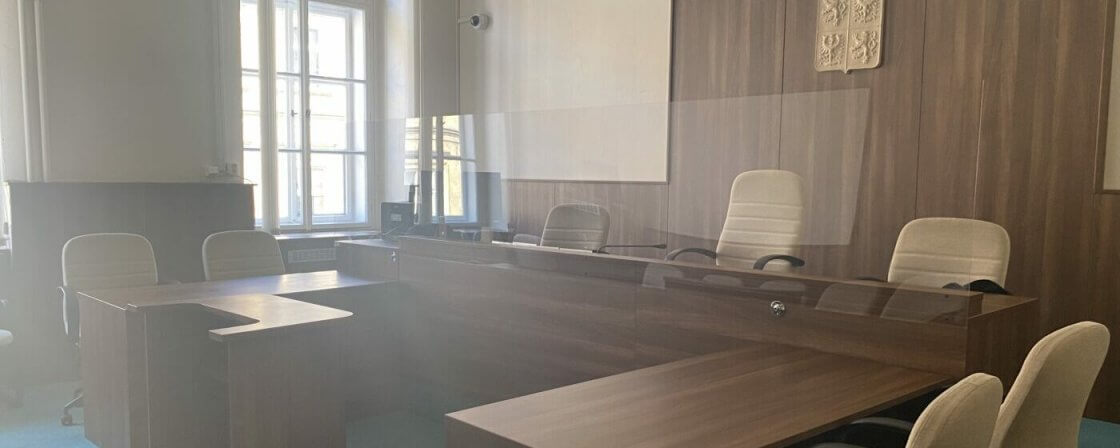The system of general courts consists of district, regional and high courts and the Supreme Court. District and county courts decide disputes and other legal matters in the first instance, and the court to which the first instance court is referred is determined by law. The county and high courts then decide appeals against decisions of the district and county courts. The Supreme Court mainly decides on appeals.
Tip for article
Find out what remedies you can use in criminal proceedings.
We have a total of 86 district courts and they form the basis of our judiciary. However, the inhabitants of our two largest cities know them by slightly different names: in the district of the city of Brno, the Municipal Court in Brno exercises the jurisdiction of the district court, and in Prague, the district courts exercise the jurisdiction of the district courts.
In Prague, instead of a regional court, we speak of the Municipal Court in Prague. The Regional Court in Prague has its seat in the capital city of Prague, however, its jurisdiction is given only to the municipalities of the Central Bohemian Region. However, it does not differ from other district and regional courts in anything other than its name.
Are you solving a similar problem?
Are you going to court?
Legal proceedings can be successful if they are carefully prepared legally. Therefore, do not leave anything to chance and use the services of a lawyer. We will conduct a careful analysis of the case and take care of the preparation of the lawsuit and representation in court, where we will vigorously enforce your rights.
I want to help in court proceedings
- When you order, you know what you will get and how much it will cost.
- We handle everything online or in person at one of our 6 offices.
- We handle 8 out of 10 requests within 2 working days.
- We have specialists for every field of law.
District Court
As their name suggests, district courts are divided by district and have jurisdiction primarily within that district. They deal with civil disputes such as contract disputes, property cases, probate, divorce and other civil matters. And they also deal with minor crimes. District courts also adjudicate in foreclosure proceedings when money claims need to be recovered.
Each district court has its own organizational rules and staffing, which includes the court’s president, vice-presidents, other judges and presiding judges. The District Court is decided by panels consisting of a judge and two presiding judges or by a single judge.
The regional court
County courts are the next important level in the judicial hierarchy, above district courts. County courts rule as second instance courts or even at first instance in more complex cases.
There are 8 of them in total – this means that not every one of our counties has its own county court. However, there are branches in counties where there is no county court.
County courts deal with more complex civil disputes and have a wider regional remit than district courts. They may deal with larger property disputes, complex contractual relationships, etc. They also deal with more serious crimes.
Regional courts consist of a president and vice-presidents, other judges and magistrates. As courts of first instance, they decide criminal cases in chambers consisting of a judge and two presiding judges. In other cases, the chambers shall consist of a president and two judges. In some cases, only single judges decide.
Tip for article
Are you going to sue? Find out how much you will pay in court fees.
High Court
There are only two High Courts in the Czech Republic – the High Court in Prague and the High Court in Olomouc. They are in charge of appeals against first instance decisions of regional courts and review the legality of decisions of other authorities in cases provided for by law.
The High Courts are composed of the president of the court, the vice-president or vice-presidents of the court and other judges. They rule in chambers composed of the president of the chamber and two judges.
Supreme Court
The Supreme Court is the highest judicial body. It decides mainly on extraordinary appeals (i.e. appeals in civil proceedings and complaints for breach of law in criminal proceedings). It also has the important function of unifying Czech case law, especially when there are different decisions of lower courts in a similar situation.
The number of Supreme Court judges is around 70. Decisions are then taken by large chambers of collegiums, three-member chambers and colleges. Extraordinary appeals are decided mainly by three-judge chambers consisting of the president of the chamber and two judges.
Other courts
Outside the system of general courts is the Supreme Administrative Court, which is a judicial body specialised exclusively in the field of administrative justice. It also comes into play at election time, when it decides on electoral matters and is often mentioned in the media in connection with the dissolution of political parties and political movements. A well-known example was that of the Workers’ Party, whose activities were found to be illegal and therefore dissolved.
The Constitutional Court of the Czech Republic is a separate chapter. Although it is sometimes regarded by laymen as a kind of last resort to which one can turn whenever all else fails, this is far from being the case. Above all, the Constitutional Court is supposed to protect and guarantee the constitutionality of the legal order. In relation to natural and legal persons, it can only intervene if their fundamental human rights have been violated.
Where can I find the criminal, civil and registry courts?
In practice, we encounter many other court names that can confuse us. However, there is no need to look for other court buildings behind them. As a rule, these are some of the courts already mentioned. Let us take a closer look at some of the names.
TheCourt of Registry is the court designated by law to keep the commercial register in which the details of businesses are entered. It is always a regional court. Commercial courts have been part of our judicial system in the past, but are sometimes still referred to by the public as county courts, as they deal with the bulk of disputes involving companies in the first instance.
In addition, we sometimes see the designation criminal court, civil court (or civil court). However, there are also no other specialised courts operating outside the ones already mentioned. In practice, it is the case that within a particular court some judges carry out the civil justice agenda and others deal with criminal law. The same is true of the administrative justice system in regional courts. Each court therefore has certain areas or agendas which it administers and if I approach it, for example, in criminal proceedings, I can describe it as a ‘criminal court’.
Tip for article
Have you been charged and prosecuted? The stakes are high and it is not worth going through the criminal process without consulting an attorney. We will conduct a careful analysis of your case and suggest a course of action for your criminal defense, in which we will vigorously enforce your rights.
Nor should we look for anything special in the term “Court of Cassation “. It is simply a court that decides on an appeal.
The only exception to the above is the Court of Arbitration. Here it is indeed a separate institution, which is established at the Chamber of Commerce of the Czech Republic. It is decided by arbitrators registered under the Arbitration Act. The Court of Arbitration is the only institution in the world authorised to arbitrate domain disputes concerning .eu domains, in addition to arbitrating disputes concerning .cz, .com, .org, .net, .biz and others. It is also the only Czech institution authorised to arbitrate consumer disputes.
When does the district court decide and when does the county court decide?
The jurisdiction of each court is divided according to the rules on subject matter and local jurisdiction, with the jurisdiction of the court and the judge being determined by law. Subject-matter jurisdiction determines which type of court (e.g. whether district or county court) will deal with cases of a certain type, in addition to whether it will hear cases at first instance or as a court of appeal. Local jurisdiction then determines which particular court (whether in Olomouc or Hradec Králové) will hear the case. This may be determined, for example, by the place of residence or registered office of the defendant, the place where the offence was committed, or the location of the property at issue in the proceedings. The Civil Procedure Code, the Criminal Procedure Code and certain other provisions lay down precise rules in this respect.
- District courts have, in principle, subject-matter jurisdiction in most civil (also enforcement, care of minors) and criminal cases at first instance.
- Regional courts decide at first instance on legally more complex matters, such as disputes concerning copyright, company law, etc. In criminal proceedings, they hear cases such as murder, some robbery and rape cases at first instance.
- High courts are mainly courts of appeal against decisions of regional courts when these courts have ruled at first instance.
Judges
Individual judges serving in the courts may be appointed after meeting relatively demanding conditions. The basic conditions are, of course, Czech citizenship, legal capacity and criminal integrity. A university degree in law and a judicial examination (preceded by three years of experience as a judicial candidate) are also required. They are appointed to their office by the President of the Republic.
Judges decide in some cases alone, as so-called single judges, and in other cases in panels. The rule of first instance courts is that they are decided by a single judge. Appeals are decided by the courts in panels of three judges.
Tip for article
An appeal is there if you disagree with the court’s decision. It is a proper remedy by which either party to a civil case can try to overturn a court decision. Find out more about it in our article.
Only a judge (even a presiding judge) who is not disqualified from hearing a case and is capable of deciding it independently, impartially and fairly can decide individual legal cases. A judge shall be disqualified if, having regard to his or her relationship with the case, the parties or their representatives, there is reason to suspect that he or she is biased. In doing so, he may either inform the parties himself that he is disqualified or the superior court may decide on his disqualification on the basis of an objection by a party.
Representatives of the people
In a Czech court, you are guaranteed not to be asked whether the jury has reached a verdict of guilty or not guilty. However, even lay people can be represented in our system as the aforementioned jurors. They sit in the robes along with the professional judge, the president of the chamber, in some cases at the first instance of decision-making. They attend all criminal trials before the district court and the county court when they are sitting as a court of first instance and dealing with a crime whose lower limit of punishment is five years or more. In civil court proceedings, the panel with the participation of the presiding judges decides only in proceedings before the district court in labour matters.
Tip for article
Read more about court judges in our next article.
Summary
The judicial system of the Czech Republic is a complex but well-structured network of institutions that are crucial for the application of law and the protection of civil rights and freedoms. From district courts, which deal with everyday civil and criminal cases, to regional and high courts, which decide on more complex matters and appeals, to the Supreme Court, which ensures the unification of case law and decides on extraordinary appeals. The Constitutional Court oversees the compliance of the legal system with the Constitution and protects the fundamental rights of citizens.
Frequently Asked Questions
What is the role of the Constitutional Court and how does it fit into the system of courts in the Czech Republic?
The Constitutional Court in the Czech Republic decides primarily on the compliance of laws and regulations with the Constitution of the Czech Republic and the Charter of Fundamental Rights and Freedoms. In the structure of the Czech courts, it stands outside the normal hierarchy of courts of first and appellate instance – it is a special body of sorts.
What is the importance of the Supreme Court in the Czech Republic and what is its relationship to the district courts in the Czech Republic?
The Supreme Court of the Czech Republic is the highest court for the judicial system (except for the Constitutional Court) in the civil and criminal spheres. It acts as an appellate court, i.e. it reviews decisions of lower courts (e.g. regional courts or district courts).
What is the difference between the Regional Court and the District Court or District Courts in the Czech Republic?
The regional court is the court of appeal against decisions of district (or circuit) courts in certain cases and may also be the court of first instance in more serious cases (e.g. major criminal offences). The circuit court (sometimes also the city circuit court) or the district court are the courts of first instance in ordinary cases – civil, commercial, criminal – for a given circuit or district.
What is the High Court and how does it fit into the system of courts in the Czech Republic when dealing with commercial disputes or enforcement of judgments?
The High Courts in Bohemia and Moravia (e.g. the High Court in Prague) are courts of appeal against regional courts in certain types of cases, such as particularly large cases or appeals. In the court system of the Czech Republic, they act as a link between the regional court and the Supreme Court in certain specialised cases. As far as the commercial courts are concerned, some cases may have an appeal just to the High Court.




